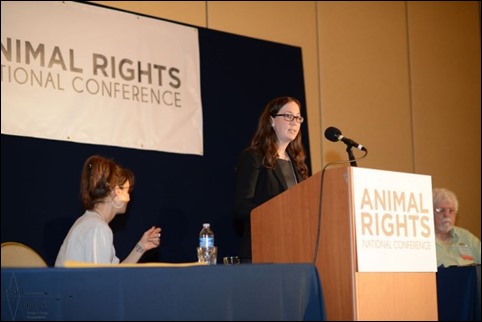
Natalie Prosin at the annual Animal Rights Conference. Photo by Anand Mehta.
The annual Animal Rights Conference is all about animal rights. Four days of talks, workshops and speeches about animal rights.
Just one problem, though … There’s only one kind of animal that has any rights at all: humans. As Natalie Prosin, Executive Director of the NhRP, explained it to the assembled company at the plenary session on June 27th:
All of us here believe in animal rights. But there’s one big problem with the whole notion of animal rights. And that is that there’s no such thing as animal rights. When you say “animal rights”, that’s a contradiction in terms. The simple fact of the matter is that the only animal that has any legal right at all is the human animal.
And while you and I may think that nonhuman animals have rights, we may recognize it ourselves by not eating them or wearing them, unfortunately at the end of the day what you or I think is irrelevant because the legal system says they have no rights.
Natalie talked about how you have to be recognized by the law as a “legal person” – as opposed to a piece of legal property – before you have the capacity for any legal right.
You and I have certain rights, because the law recognizes us as legal persons. 250 years ago, there were hundreds of thousands of human beings in this country who were not recognized as human beings. They were the slaves. They weren’t persons; they were property – the property of their slave owner who was a legal person.
And the same was true in times gone by for women and children. And it’s still the case for any and every nonhuman animal, regardless of their cognitive capacities.
So while there have been many advances in animal welfare – protecting animals through legislative, legal, and grassroots efforts, when you boil it all down, animals are still considered property. They are no different from a chair or automobile. And this is true for every nonhuman animal in the world.
Natalie talked briefly about how we at the NhRP are working to create the first breach in “the legal wall that separates all humans from all nonhumans.” And she explained why we are focusing on certain particular animals:
In order to have the best shot at winning, we will be filing on behalf of the most cognitively complex nonhuman animals, which include all four species of great apes, elephants, and cetaceans. These animals possess qualities that we believe are sufficient, not necessary, but sufficient to trigger fundamental legal rights. Such qualities include consciousness, practical autonomy, self awareness, self consciousness, and theory of mind.
At a later workshop, Natalie elaborated on all of this, giving the example of a suit that was brought against the Los Angeles Zoo last year. The judge wrote a 55-page scathing indictment of the zoos treatment of the elephants, but he explained that his hands were tied in terms of sending them to a sanctuary because the elephants are the legal property of the zoo and cannot be taken away from their owners except in truly dire circumstances of cruelty. As Natalie described it:
This case highlights perfectly the gaping hole in the animal rights movement. The judge was terribly sympathetic to the elephants’ plight but in the end, there was nothing he could do because currently, elephants are considered pieces of property just like your car sitting out in the parking lot.
In order to persuade a judge (and then a state high court) that at least some nonhuman animals should be recognized as “legal persons”:
We have spent the last five years identifying which American state jurisdictions may be the most receptive to an array of arguments that favor legal personhood for at least one nonhuman animal. We have researched, analyzed, and argued about 60 different legal issues to find our top jurisdictions in which we might have a real shot at winning our cases.
Not surprisingly, given the urgency of the need for the term “animal rights” to take on real meaning, there was intense interest in this topic at the conference.
Many thanks to all who attended, and to the organizers of the conference for including the NhRP on its agenda.